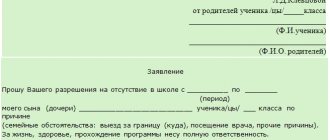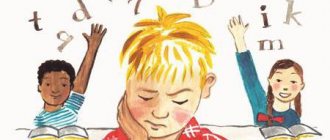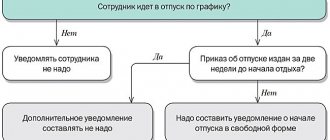Who writes testimonials at school?
The characteristics of a student in a general education institution is a kind of mini-dossier that contains information about the child that is of a personal nature, including biographical data, both positive and negative character traits, emotional and psychological state, intellectual and creative abilities, presence or absence bad habits or deviant behavior, description of relationships in the team and within the family. The characteristics are written either by the class teacher, or by the head teacher or director of a general education institution, with the assistance of a school psychologist, who provides the results of tests or diagnostics.
Its content directly depends on where the reference from the school may be required: for submission to the court, the police, the juvenile affairs department, the place of further study, or to the guardianship and trusteeship authorities. It is written on the official letterhead of the school with the seal of the institution and the signature of the compiler.
Samples and rules for writing a character reference for a supervised student
Ward minor children are a preferential category that receives special attention during childhood and adolescence up to 18 years of age. The guardianship authority supervises the families raising these children. He is constantly in touch with guardians and all departments where they realize themselves or are registered: with schools, kindergartens, hospitals, administration, commission for minors, police, and other organizations. This institution collects information, primarily from schools, in the form of characteristics of the children in their care.
For guardianship, information from school is practically the main document indicating the level of education of the ward at any age - elementary, middle and high school. In the last two cases, children may lose motivation for learning; it becomes a secondary priority for them, and the first priority is mastering certain roles in a team and relationships with peers. Taking these features into account, the document should reflect:
You may like => Criminal and Civil Liability of Separate Categories
Academic achievement, extracurricular activities. Ability to perceive information and perform oral and written tasks. Accurately maintain notebooks, diaries and written materials. Ability to plan your work, act according to plan (time). Ease of learning educational material, awareness of new knowledge, ability to apply it in new situations. Favorite subjects, interests in science, especially in relation to labor lessons. Additional activities: in clubs, sports, organizing, artistic activities, etc.
Often, when drawing up a document, a student’s qualities are depicted as a scale. In this way, it is possible to assess how and to what extent each personality trait or behavior is expressed. For example, “study”: between the points “good student - bad student” there is a scale with 6 (or more) divisions, where the teacher can indicate the desired option.
Why do you need a reference from school?
The requirement to provide such a document has become common in recent years for various structures and institutions. This is due to the fact that it saves organizations from wasting time and allows them to quickly find out as much personal information about the child as possible, which during a conversation with the student himself and his environment will not be so objective, accurate and truthful. Plus, the characteristic makes it possible to draw a psychological portrait of a person in absentia, even before personal acquaintance.
Positive reference for a primary school student
Characteristics for a student of grade 3-B "MOU School No. 35" in Arkhangelsk
Kolkhoznikov Daniil Vasilievich, living at the address: st. Moskovskaya, 28, apt. 112.
Daniil Kolkhoznikov has been studying at school No. 35 since the first grade. He is brought up in a full-fledged family with his younger brother. Parents take an active interest in their son’s school life, regularly attend parent-teacher meetings and monitor the educational process. The family's financial situation is stable, the child has never needed anything.
The student has high intellectual abilities and a thirst for new knowledge in various fields. The desire and ability for the exact sciences and mathematics are especially noticeable. Possesses the skills of independent and team work in the classroom, thinks logically, analyzes, draws conclusions, and clearly expresses his thoughts or position.
Daniil’s behavior is exemplary: he does not violate discipline in the classroom and order at school, and does not skip classes.
Positive character traits include: hard work, perseverance, kindness, honesty, willingness to help classmates, responsibility and sociability. There are no bad habits. Negative character traits include excessive curiosity, stubbornness and slightly inflated self-esteem.
The student is distinguished by a high level of education, tact, and respect for elders. He enjoys authority among his peers. He is interested in boxing and has received gold and silver awards at the city level.
He studies at an art school, where he shows consistently high results.
He studies excellently, regularly completes his homework, and treats the teacher’s requests conscientiously.
Sample template for characteristics of a supervised student
- Personal data.
- Attitude to learning: responsible, diligent, diligent, hardworking, passive to learning, attentive student. He studies to the fullest extent of his ability, needs constant supervision, does not do well, and does not show interest in learning.
- Participation in the life of the school. Behavior, character. Performs public assignments conscientiously/refuses to do so. In behavior, modest, cheerful, balanced, melancholic, susceptible to the influence of others. Teachers' demands (fulfills, ignores, has disciplinary violations). In communication with peers (friendly, nervous, ready to help, withdrawn, aggressive).
- Relationships in the family (trusting, friendly, dismissive).
Characteristics of a truant student
Sometimes the school has to issue such a document for a truant student. The characteristics of a student who does not attend school have a similar structure, but differ in content, which is quite justified.
Characteristics for a student of grade 8-B of Municipal Educational Institution “School No. 131” in Moscow
Sidorenko Lyudmila Glebovna, living at the address: Moscow, st. Geroev Stalingrada, 14, apt. 5.
Student of school No. 131 Lyudmila Glebovna Sidorenko has been studying at this educational institution since September 1, 2003. He is brought up in a full-fledged family, but does not consider his parents to be authorities, and therefore relationships in the family are complex. Parents try to pay maximum attention to their daughter, but all attempts to interfere in her personal and school life are met with hostility.
The student's intellectual abilities are at a sufficient level, she shows interest in chemistry and biology, geography and history. At the same time, he shows unsatisfactory results in mathematics, Russian language and literature. Lyudmila has mental and thinking abilities, but due to laziness, she shows them reluctantly. He often expresses his personal opinion in class and substantiates it, but in a rather harsh form. Does not tolerate compromises.
He skips classes often and for no reason, citing a lack of interest in studying.
Positive character traits include: sociability, openness, honesty, increased understanding of justice. Negative character traits include stubbornness, irresponsibility, laziness, self-confidence bordering on narcissism.
Shows no interest in creativity. Shows good results in sports and is actively involved in martial arts.
Relationships in the team are tense. He knows how to find a compromise with classmates only if it is beneficial, otherwise he prefers to remain silent, without entering into open conflicts.
There are no bad habits.
He studies well only in those subjects in which he shows interest. The level of knowledge in Russian language and literature, algebra and geometry is below average due to regular absenteeism. Has a tendency to cheat, but has the potential to show better results.
Characteristics of the average school student
Characteristics for a student of grade 7-A of Municipal Educational Institution “School No. 51” in Simferopol
Myznikova Vitalina Alekseevna, living at the address: st. Dmitry Ulyanov, 6, apt. 15.
Myznikova Vitalina Alekseevna moved to school No. 51 in 2021. Before that, she studied at several educational institutions, which was associated with frequent family moves. The family is complete: the father is a military man, the mother is a housewife. In the family, due attention is paid to discipline, upbringing and education of the child.
In the educational process, Vitalina demonstrates average knowledge, is inactive in class, and is reluctant to answer at the blackboard, but she consistently writes independent work and tests with a solid B. Completes homework regularly, but not always diligently, and does not show initiative in learning. Has gaps in mathematical knowledge, giving more preference to the humanities. Has a limited vocabulary, which is associated with indifference to reading.
According to the school psychologist, the student’s level of knowledge was significantly affected by constant moving. This also had a negative impact on the girl’s emotional state. It is difficult for her to find a common language with her peers, she tries not to make close friendships, and jealously guards her personal space.
Positive qualities include: decency, responsibility, fairness, honesty. Negative character traits include isolation, laziness, low self-esteem, and inability to concentrate.
She takes part in the social life of the class and is always ready to defend the honor of the class and school at sporting competitions. He is especially interested in gymnastics and acrobatics.
Characteristics of a difficult teenager for the police or court
Characteristics to the court
This is what a character reference for a difficult teenager looks like in court:
For the police
Characteristics of a student in grade 11-B of Municipal Educational Institution “School No. 98” in St. Petersburg
Raduzhny Mikhail Sergeevich, living at the address: st. Sovetskaya, 14, apt. 65.
Raduzhny Mikhail Sergeevich has been studying at school since the first grade. Until the seventh grade, I was raised in a full-fledged family; after my parents’ divorce, I stayed to live with my mother and stopped communicating with my father. According to the psychologist, this factor negatively affected the child, and he began to demonstrate deviant behavior, became uncontrollable, denying all human values, blaming his father for all his troubles. Both the student’s mother and the child himself refused the help of a psychologist, believing that they could cope on their own.
Communication with classmates goes well, he has established himself as the life of the party, but he does not respect his elders and treats his studies with complete indifference. He often skips classes, doesn’t do his homework, and often just relaxes in class.
Positive character traits include communication skills and honesty. Negative - complete irresponsibility, laziness, stubbornness. He can be rude to teachers, but he treats his classmates with respect, helps and protects the younger and weaker.
Bad habits: smokes, has been repeatedly seen drinking alcohol.
He is actively involved in sports and plays football. Popular among girls. Always neat and tidy. He tries to participate in the life of the class: he is a leader in all creative events, including KVN, concerts and sports competitions.
Due to his denial of generally accepted values, he was repeatedly called to the director, and preventive conversations were held with him. Until the last moment he was not involved in the juvenile affairs department.
Pedagogical characteristics for a ward child to the Social Protection Committee
By nature, the STUDENT is a kind, sociable, cordial, responsive boy. He makes contact with adults and children easily. In communication he is talkative, attentive, and friendly. In the course of communication, he strives to establish and maintain positive relationships, but very often he initiates fights with children, without any apparent reason. When communicating with children, the STUDENT shows increased sensitivity, uncontrollability, disinhibition, combined with aggressiveness, pugnacity and conflict. A STUDENT often expresses thoughts about the injustice of others, which causes him to feel resentful, gives him reason to consider himself an undeserved victim, and to show aggressiveness towards his classmates.
We recommend reading: List of things that bailiffs can describe
PARENT No. 1 pays a lot of attention to the child in terms of upbringing. She often attends school, actively cooperates with teachers, is constantly interested in his progress in studies, controls his behavior (she was present in lessons several times), helps the STUDENT with homework, and demands that the STUDENT fulfill all the required tasks. If any problems arise in a child, PARENT No. 1 immediately reacts and tries to find methods to solve these problems. She promptly pays for the child’s meals in the school canteen, buys school supplies, clothes, and promptly pays for all cultural and public events. Throughout all years of study, he is present and takes an active part in parent-teacher meetings and participates in all class and school events. It should also be noted that she is helped in everything by her husband (PARENT No. 2 - the STUDENT'S guardian), who is also interested in the child's success, cooperates with the teacher and the class committee, and, whenever possible, provides assistance in renovating the office.










